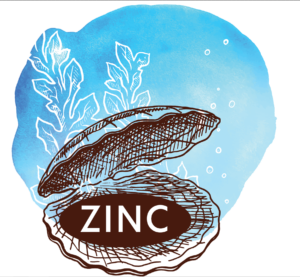 Zinc may only be a trace mineral (i.e., your body only needs a very small amount of it), but it is essential to your health. The human body cannot produce or store zinc on its own. other trace minerals, zinc is the second most abundant trace mineral in the body, after iron, and is present in every human cell.
Zinc may only be a trace mineral (i.e., your body only needs a very small amount of it), but it is essential to your health. The human body cannot produce or store zinc on its own. other trace minerals, zinc is the second most abundant trace mineral in the body, after iron, and is present in every human cell.
WHY IS ZINC IMPORTANT?
Creation of DNA and essential to cell growth. Zinc plays an important role in cell reproduction and contributes to a number of vital bodily processes, including electrolyte absorption, neurotransmission, hormone regulation, and enzyme production.2,3 Through these pathways, zinc contributes to DNA and RNA synthesis, protein metabolism, and overall human growth and development. In both animal and human studies, zinc deficiency can impact physical development, which is why adequate zinc is particularly important in children and adolescents during their rapid growth cycles and during pregnancy and lactation.4,5
Boosts immune function. Because zinc supports the growth
and normal functioning of immune cells, people with a zinc deficiency are more susceptible to a variety of pathogens.4,6 Even a slight deficiency in zinc can slow down the activity of lymphocytes, neutrophils, and macrophages, all of which protect the body from invading pathogens.3 Zinc is also necessary to activate T cells, a part of the immune system that focuses on shutting down specific foreign particles and regulating immune responses.7-9
Promotes wound healing. Zinc plays a role in maintaining skin integrity. For example, it is needed to create new skin cells, particularly in collagen and fiber-like tissues, supports the skin’s immune function, and combats dermal6 inflammation. Each of these functions is necessary for repairing damaged skin cells and supporting healthy, resilient skin structure. You may have used a zinc-containing ointment on your nose for protection against sunburn. One of the most visible effects of zinc deficiency are poorly healing skin ulcers or extensive burns.
HOW MUCH DO I NEED?
Because zinc is a trace mineral, your body only needs a small amount of it. Most people in developed countries do not need to worry about a deficiency because they can obtain their daily dose of zinc through diet alone. The Recommended Dietary Allowance (RDA) in adults is 11mg a day for men and eight milligrams for women. Pregnancy and lactation require slightly higher amounts of zinc to accomodate the growing fetus.2
HOW DO I GET IT?
Zinc bioavailability is highest in meat, eggs, and seafood.1 It also can be found in beans, nuts and seeds, whole grains, dairy products, and fortified breakfast cereals and other nutritionally enriched foods. Individuals who limit their intake of or do not consume any animal-based foods should be mindful of the possibility of inadequate zinc consumption due to the lower bioavailability of zinc in plant-based foods.
SOURCES
1. Higdon J. Zinc. Linus Pauling Institute at Oregon State University website. https://lpi.oregonstate.edu/mic/ minerals/zinc. Updated Feb 2019. Accessed 3 Sep 2020.
2. Kubala J. Zinc: everything you need to know. Healthline website. https://www.healthline.com/nutrition/zinc. Updated 14 Nov, 2018. Accessed 3 Sep 2020.
3. Liu E, Pimpin L, Shulkin M, et al. Effect of zinc supplementation on growth outcomes in children under 5 years of age. Nutrients. 2018;10(3):377.
4. The Nutrition Source: Zinc. Harvard T.H. Chan School of Public Health website. https://www.hsph.harvard. edu/nutritionsource/zinc/. Accessed 3 Sep 2020.
5. Roohani N, Hurrell R, Kelishadi R, et al. Zinc and its importance for human health: an integrative review. J Res Med Sci. 2013;18(2):144–157.
6. Wilson DR. What are the health benefits of zinc? Medical News Today website. https://www. medicalnewstoday.com/articles/263176. Updated 5 Dec 2017. Accessed 3 Sep 2020.
7. Wessels I, Maywald M, Rink L. Zinc as a Gatekeeper of Immune Function. Nutrients. 2017;9(12):1286.
8. Bonaventura P, Benedetti G, Albarède F, et al. Zinc and its role in immunity and inflammation. Autoimmun Rev. 2015;14(4):277–285.
9. Sullivan D. Zinc Deficiency. Healthline website. https:// www.healthline.com/health/zinc-deficiency. Updated 8 Mar 2019. Accessed 3 Sep 2020.
10. Olsen N. All you need to know about zinc deficiency. Medical News Today website. https://www. medicalnewstoday.com/articles/320393. Updated 22 Dec 2017. Accessed 3 Sep 2020.
11. Rao G, Rowland K. PURLs: Zinc for the common cold: not if, but when. J Fam Pract. 2011;60(11):669–671.




